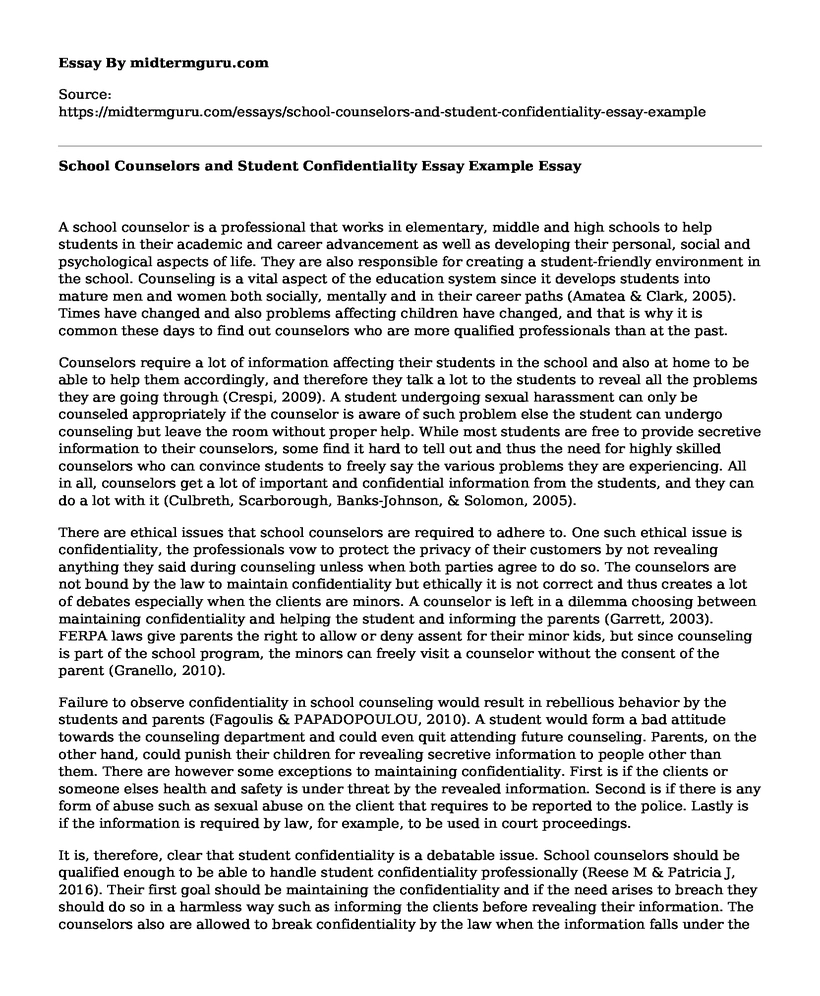A school counselor is a professional that works in elementary, middle and high schools to help students in their academic and career advancement as well as developing their personal, social and psychological aspects of life. They are also responsible for creating a student-friendly environment in the school. Counseling is a vital aspect of the education system since it develops students into mature men and women both socially, mentally and in their career paths (Amatea & Clark, 2005). Times have changed and also problems affecting children have changed, and that is why it is common these days to find out counselors who are more qualified professionals than at the past.
Counselors require a lot of information affecting their students in the school and also at home to be able to help them accordingly, and therefore they talk a lot to the students to reveal all the problems they are going through (Crespi, 2009). A student undergoing sexual harassment can only be counseled appropriately if the counselor is aware of such problem else the student can undergo counseling but leave the room without proper help. While most students are free to provide secretive information to their counselors, some find it hard to tell out and thus the need for highly skilled counselors who can convince students to freely say the various problems they are experiencing. All in all, counselors get a lot of important and confidential information from the students, and they can do a lot with it (Culbreth, Scarborough, Banks-Johnson, & Solomon, 2005).
There are ethical issues that school counselors are required to adhere to. One such ethical issue is confidentiality, the professionals vow to protect the privacy of their customers by not revealing anything they said during counseling unless when both parties agree to do so. The counselors are not bound by the law to maintain confidentiality but ethically it is not correct and thus creates a lot of debates especially when the clients are minors. A counselor is left in a dilemma choosing between maintaining confidentiality and helping the student and informing the parents (Garrett, 2003). FERPA laws give parents the right to allow or deny assent for their minor kids, but since counseling is part of the school program, the minors can freely visit a counselor without the consent of the parent (Granello, 2010).
Failure to observe confidentiality in school counseling would result in rebellious behavior by the students and parents (Fagoulis & PAPADOPOULOU, 2010). A student would form a bad attitude towards the counseling department and could even quit attending future counseling. Parents, on the other hand, could punish their children for revealing secretive information to people other than them. There are however some exceptions to maintaining confidentiality. First is if the clients or someone elses health and safety is under threat by the revealed information. Second is if there is any form of abuse such as sexual abuse on the client that requires to be reported to the police. Lastly is if the information is required by law, for example, to be used in court proceedings.
It is, therefore, clear that student confidentiality is a debatable issue. School counselors should be qualified enough to be able to handle student confidentiality professionally (Reese M & Patricia J, 2016). Their first goal should be maintaining the confidentiality and if the need arises to breach they should do so in a harmless way such as informing the clients before revealing their information. The counselors also are allowed to break confidentiality by the law when the information falls under the exempted cases (Lazovsky, 2008). Schools, on the other hand, should work closely with the counseling department and recognize the importance of it in students development. Schools should provide enough support to the counseling team as well as hiring professionals who understand modern children problems and ways to solve them.
References
Amatea, E. & Clark, M. (2005). Changing Schools, Changing Counselors: A Qualitative Study of School Administrators' Conceptions of the School Counselor Role. Professional School Counseling, 9(1), 16-27. http://dx.doi.org/10.5330/prsc.9.1.w6357vn62n5328vp
Fagoulis, I. & PAPADOPOULOU, E. (2010). THE ROLE OF SCHOOL COUNSELOR IN ALLEVIATION OF OCCUPATIONAL ANXIETY OF PRESCHOOL TEACHERS. Review Of European Studies, 2(1). http://dx.doi.org/10.5539/res.v2n1p72
Crespi, T. (2009). Group counseling in the schools: Legal, ethical, and treatment issues in school practice. Psychology In The Schools, 46(3), 273-280. http://dx.doi.org/10.1002/pits.20373
Culbreth, J., Scarborough, J., Banks-Johnson, A., & Solomon, S. (2005). Role Stress Among Practicing School Counselors. Counselor Education And Supervision, 45(1), 58-71. http://dx.doi.org/10.1002/j.1556-6978.2005.tb00130.x
Garrett, T. (2003). Being Good: Rethinking Classroom Management and Student Discipline (review). Theory Into Practice, 42(4), 351-352. http://dx.doi.org/10.1353/tip.2003.0044
Granello, D. (2010). Cognitive Complexity Among Practicing Counselors: How Thinking Changes with Experience. Journal Of Counseling & Development, 88(1), 92-100. http://dx.doi.org/10.1002/j.1556-6678.2010.tb00155.x
Lazovsky, R. (2008). Maintaining Confidentiality with Minors: Dilemmas of School Counselors. Professional School Counseling, 11(5), 335-346. http://dx.doi.org/10.5330/psc.n.2010-11.335
Reese M, H. & Patricia J, M. (2016). Advocating for Better Futures for All Students: A New Vision for School Counselors. Questia.com. Retrieved 26 October 2016, from https://www.questia.com/library/journal/1G1-53985384/advocating-for-better-futures-for-all-students-a
Cite this page
School Counselors and Student Confidentiality Essay Example. (2021, May 24). Retrieved from https://midtermguru.com/essays/school-counselors-and-student-confidentiality-essay-example
If you are the original author of this essay and no longer wish to have it published on the midtermguru.com website, please click below to request its removal:
- Studying Online: Coursera
- Should Homework Be Abolished in Public Schools? - Essay Sample
- Why Grandparents Are Raising Their Grandchildren? - Essay Sample
- Find the Perfect Roommate: Tips to Consider - Essay Sample
- Deborah Tannen: How Language Affects Relationships - Essay Sample
- My Education Journey: A Rewarding Experience Despite Challenges - Essay Sample
- Positive Reinforcement: Strengthening Behaviour With Desirable Stimulus - Research Paper







